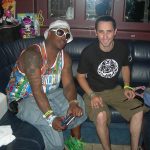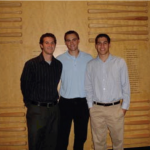Dan Fumai is the Vice President Controller for the San Diego Padres. after spending eleven years with the accounting firm PriceWaterhouseCoopers. His goal while attending Boston University was to become a partner in an accounting firm. Interestingly enough, he was one year away from accomplishing that goal when he left the firm for the Padres after eleven years of service. When asked why he left, he still wasn’t sure but said that it was a once in a lifetime opportunity that he could not resist.
 Dan works mainly with baseball’s Debt Service Rule and said that 25% of his responsibilities with the organization are devoted to the rule. When asked what he enjoyed most about his both his position with PWC and now with the Padres, he responded by saying that the people you work with is the most important thing. “If you don’t enjoy the person you work for or the people you work with, then you will not be happy even if you are getting paid double the amount of money.”
Dan works mainly with baseball’s Debt Service Rule and said that 25% of his responsibilities with the organization are devoted to the rule. When asked what he enjoyed most about his both his position with PWC and now with the Padres, he responded by saying that the people you work with is the most important thing. “If you don’t enjoy the person you work for or the people you work with, then you will not be happy even if you are getting paid double the amount of money.”
 His advice to students is to express your interests to your employer so that they will provide you with opportunities that you will enjoy. Mr. Fumai communicated his love for sports to PWC, so they couldn’t really blame him when he packed his bags and headed for San Diego. When asked on how students should go about getting a job in sports, he said, “try and meet as many people as they can so that they can think of you for openings that may arise. “It’s not who you know, but who knows you.”
His advice to students is to express your interests to your employer so that they will provide you with opportunities that you will enjoy. Mr. Fumai communicated his love for sports to PWC, so they couldn’t really blame him when he packed his bags and headed for San Diego. When asked on how students should go about getting a job in sports, he said, “try and meet as many people as they can so that they can think of you for openings that may arise. “It’s not who you know, but who knows you.”
Interview
I went to Boston University. I was an accounting major. I always thought I’d be in public accounting. My main goal was to be a partner. That was going to be my career. All through college, public accounting is what I focused on. It was the route I thought I was going to go. In college, that was my goal the whole time. Get a job junior year, have fun senior, be ready to go my first year, and pound it out for the next ten or eleven or twelve years it was going to take to be a partner of an accounting firm. In college, that’s where I was.
I worked for PriceWaterhouseCoopers for almost twelve years. Eleven and something. I was up for partner the following year when this job opened up. The guy who had my job before me…this was actually one of my clients when I was in public accounting. Qualcom and the Padres were the big clients in San Diego. The person who had my job ended up transferring on to the Red Sox. The whole regime that was here, Larry Luchino, ended up going to Boston. On the tail end of that whole thing, the guy who previously had this job went to the Red Sox. So this job opened up. That’s how I ended up here. Just left public accounting.
I moved around a lot before I got to San Diego. I’m kind of a nomad. I go where I think something in my career that I wanted to do. I moved a couple of times. When I was in San Diego, this job opened up. It was a big choice because I was getting close to what my whole goal was coming out of college. This was one of those opportunities I kind of walked into it. I wasn’t really looking for it. I liked what I was doing. So it was this big choice. It took me forever.
Fred, who is the CFO, was the person who offered me the job. He asked me what I really wanted to do. And I was like, “Can I get back to you in a week?” It took me forever. I was doing the whole pros and cons. I was going to make a lot less money for the rest of my life doing this than I will that. I was kind of going through all the things that I liked and didn’t like about it.
I am a big sports fan. Fred and I have a lot of good baseball conversations. We’ll go back to like, the mid seventies and talk about some random baseball player. I had a good relationship with him. He was a driving force for me to come. I wanted to work with someone I actually got along with. Not that I didn’t at PWC, but it was a big change of jobs. So at least I liked the person I worked for. That’s a good start.
There’s a lot of things that went through my head in that time period of what I wanted to do. Whether I was going to stay and become a partner, or leave and come to a baseball team. Which, as I said, may not be an opportunity I would get again.
I was on the audit side.
Probably none of best experiences were work related. It was mostly the people that I worked with. It’s a good environment because everyone is professional and driven. For the most part, you could count on people picking up the slack at work and stuff. But it was the people that you met that you had a good relationship with, and liked to go out with, especially in those first few years.
I started in Boston. It was one of the biggest offices at PriceWaterhouse. Tons of younger students and people in an age group of twenty to thirty is huge. There’s a lot of fun getting to meet all those people and getting to have a little group of people that were like your fraternity. I still have a group of people who I started with, our audit entry class that had like a hundred people in it.
Every year like twenty people leave so you’re always crossing out the faces and names of the people you used to work with. It’s kind of fun. We teased each other, ‘I bet you leave before I do.’ The social aspect of it was good. There was a lot of learning. Seeing different companies. Hi-tech, manufacturing, entertainment industry companies.
I did a lot of merger acquisition work, so I learned a lot during that time period. The fun part was the people you started with that you still talk to.
And say, ‘Hey, remember the guy whose shoes we stole?’
What gives you joy in the job?
I kind of get into baseball. Even as a kid I was always like, into statistics. Numbers were always big thing. It’s kind of geeky, but I used to play Stratomatic baseball. I don’t know if you know what that is, but I was always into this stratomatic numbers and dice and statistics and stuff.
It’s kind of cool seeing it from, the inside. What analysis goes into player development and things like that. It’s not something I get to do on a daily basis, but I do get to talk to the people that do it, here and there. Like Kevin, or Fred Ulhman, who you’ll meet next.
He’s more into baseball than the CFO. He actually just dropped off all this Baseball Prospectus stuff for me to read.
If you have to do accounting…you know what I mean? It’s not the most exciting thing in my whole life. It’s something you get accustomed to doing and kind of feel that you got good at it. So it kind of comes naturally at this point. But it’s kind of cool to actually do it at someplace where I’m interested in the product. So it’s fun seeing the expenses that you have, and going out and watching it and seeing what it does every night.
Difficult part about the job?
It’s definitely one of those weird, big transitions from public accounting to private accounting. I don’t know if it has anything to do with working at the Padres. But it’s just a big change from going out and grinding it out, and hammering stuff. The financials have to get out, “Boom! Bam!’ You’re done and you move on…but here, things sometimes either linger. It’s not that cut off date. You’re always dealing with it as you go along.
Having to working on the close every month. It’s a different aspect than going out to a company and looking at their year end numbers, or their quarter end numbers, signing off on it and being done with it. It’s like this constant… ‘Why is this not reconciled from April? I thought this was going to be off in March?’ Things like that, the kind of daily grind, stuff. That’s probably the thing. That’s more of a private accounting versus a public accounting issue than anything else.
What school not teach you that the working world has?
It’s probably just working with issues and people. It’s hard, and I’m probably guilty more than others, but I try to treat everyone the same. I don’t know if that’s necessarily the right way to go, but everyone has their own way of dealing with things. I’m always like, “No no. You just have to do this. We’ll get it done.” Some people don’t take it the same way.
I always thought that if you treat everyone the same, that’s the right way to do it. But after awhile, I think, maybe, it’s not the right way to do it.
I don’t know if I have a real key to success. If you work hard enough, and you’re confident in what you do. Hard work creates opportunities. Like falling into this. This really wasn’t…if this was fifteen years ago…ten years ago…five years ago…I probably had no idea that this is what my job would be. I never wanted to be a controller anywhere. I was never into the daily closing of the books. It wasn’t really what I wanted to do.
But it is kinda cool in this industry. So it’s kind of a tradeoff, but hopefully, someday, I’m not the person at the end of the day in charge of the general ledger.
If you work hard enough, and you study, and you look at yourself and what you want to do, eventually you’ll get to what you want to do. Because that opportunity that you need or want will be there for you.
That’s kind of my goofy success thing.
I love working here. It’s fun. The people here are really nice. You get to do different things. Like last weekend I went to Chicago with the team and with the guys who do corporate development. So the sponsor guys. So we had a few sponsors there and some suite holders. We took them out and entertained them. It’s kind of a step outside of the accounting world.
I guess I’m the only VP here that’s single. I guess I get called along on these things to entertain sponsors and stuff like that. So it’s kind of cool. Such a good time in Chicago.
It’s something I wouldn’t necessarily have the opportunity to do as a controller or a CFO in another industry. It’s kind of a different atmosphere. As I said, everyone here is so cool to work with. Fred Ulhman, who you’ll meet next, is like the nicest guy. Dealing with him on the issues between the baseball department and us. Payroll issues and stuff like that.
He’s really good at the budgeting part of it, which I don’t know how many assistant GM’s do that in other places.
I like who I work for.
One of the other things that people don’t appreciate as much is that if you like the person you work for, it makes your life a whole lot easier. And easier to deal with. I rather make half the money and have a place where I like to go and be happy and deal with a good person than make all the money in the world and hate going there every day. That’s the great thing about working here.
To answer your question, after all my ramblings, I see myself working here as long as they’ll let me stay here.
There are certain times here when it’s really busy, but it’s certainly easier than public accounting. I mean public accounting, it’s like, after December, ‘I’ll see you in…May.’ But here it’s a little easier. I have peaks and valleys during months. Definitely have a week or two where you can get out at five o’clock if you come in at 7:30. You’re good by five.
It’s just pieces here and there where you’re really busy. But it makes it easier to balance your life and go out socially in this job than it was in my former job.
We don’t determine a players worth. Fred can talk to you about that. They determine what a guy is worth at the end of the day.
What we do on our side, I don’t know if you ever heard about the debt service rule. My biggest responsibility here is that I am the keeper of the debt service rule. I’m the person that has to know what the NDLR is for the club. All that kind of stuff. That’s what I track.
I deal with baseball operations when they give me player moves. I’m actually working on the Chan Ho Park accounting right now, because he has a bunch of deferred comp. So I have to figure out how much deferred comp is in the current year. How much is interest.
It makes a big difference in the debt service rule if it’s salary or interest. So I’m kind of working through that right now.
I would say at the end of the day, my biggest responsibility here. I have a meeting Thursday about it. I had a meeting Monday about it. All it is, is giving updates on, ‘If our attendance is this, what do you think it’s going to be?’
Reforecasting the financial statements and working on the debt service rule is kind of…twenty five percent of my life is dealing with that. After a while it’s a grind, where you run your eighty seven spreadsheet with an attendance change of twenty-five thousand. That’s probably my biggest job responsibility here.
At first, the first day you come sit in this chair you go, ‘I don’t know what the hell I’m supposed to do.’ I kind of knew what a controller did from working with them, but in this place, I’m opening up files that the previous controller did. When I started, it was like, ‘Here’s all your files…fly away.’
That was the scariest day of my life. Sitting in this chair and having no idea what my day to day duties are going to be. But I don’t regret it.
That was my first thought though. I was like, ‘This is the dumbest thing I’ve ever done.”
I never intended to work in sports. I kind of fell into it. I’m not the best example of how to figure out how to get your face in. I know in public accounting I expressed an interest in hi-tech and sports. When I moved to North Carolina, I got the Durham Bulls as one of my clients because they were part of a broadcasting company.
I ended up getting a little experience there, so when I moved to San Diego, they asked me if I wanted to work on the Padres in your free time when you’re not working on Qualcomm. It’s just letting people know what you’re interested in, and what you like. And meeting as many people as you can that could potentially help you with it. Just someone who is always willing to keep you in mind.
It’s not who you know, but really who knows you.
One day, I was asked if I would be interested in interviewing for this job. I was like, ‘Uh…okay. I’ll give it a shot.’ I figured I wasn’t going to get it, I wasn’t going to get offered the job anyway. They’re interviewing like, fifteen people so I’ll just interview for it. It will make them feel good that they got another person in here to try out. All of a sudden, it was like, “You wanna do it?” And I was like, “Uhhhhhh….I wasn’t expecting this whole part of the interview.”






